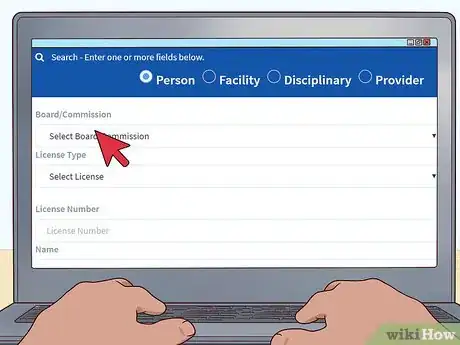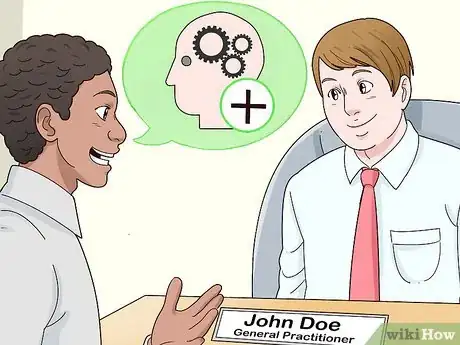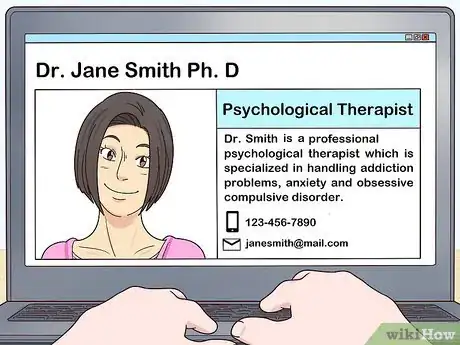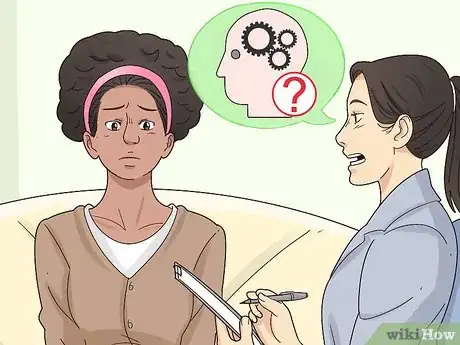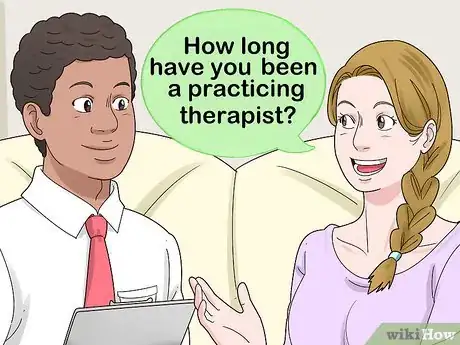This article was co-authored by Trudi Griffin, LPC, MS. Trudi Griffin is a Licensed Professional Counselor in Wisconsin specializing in Addictions and Mental Health. She provides therapy to people who struggle with addictions, mental health, and trauma in community health settings and private practice. She received her MS in Clinical Mental Health Counseling from Marquette University in 2011.
There are 11 references cited in this article, which can be found at the bottom of the page.
This article has been viewed 44,177 times.
Finding a mental health counselor or therapist can be difficult, especially if you have never been through therapy before and do not know where to start. You will need to consider what type of therapist you should see, what your needs are, and whether or not the therapist will accept your insurance. The first meeting that you have with your therapist can also be an opportunity to ask questions and see if you feel comfortable talking to the therapist. As you conduct your search, keep in mind that you might have to try out a few therapists to find one who makes you feel comfortable.
Steps
Finding a Therapist
-
1Determine your needs. Identifying your needs can help you to choose a therapist who has experience working with clients with similar needs. Before you start looking for a therapist, think about why you want to start therapy. You can ask yourself some questions to begin to describe the problem.
- Some questions to ask yourself may include: What symptoms have you been having? How long has the problem been going on? What areas of your life is your problem affecting (social, family, friendships, work, school, romantic relationships, etc.)? How severe is the problem? Talk out your answers to these questions with a trustworthy friend or family member, or write out your answers to help you identify your priorities for therapy.
- For example, you might want to see a therapist because you have been crying a lot lately and withdrawing from your friends and family. The problem may have started about six months ago and you might feel like it is affecting your relationships and ability to do your job. You might feel that the problem is somewhat severe.
- Or, you might have noticed that you compulsively spend lots of money on unnecessary items, such as clothes, electronics, or other luxury items. You may estimate that you have been struggling with this problem for over a decade. The behavior might be affecting your relationship with your spouse. You might feel like this problem has gotten worse over the years and that now it is quite severe.
- If you're seeing someone for mental health issues for the first time, just make sure it's someone you feel comfortable with. If you need a referral for medication later, your mental health counselor or psychotherapist will help get a referral for you to someone who can help you obtain medication.
-
2Consider the different types of mental health professionals. Every type of mental health professional has a slightly different focus. Before you start looking for a therapist, consider the different types of mental health professionals and choose the best one to suit your needs.[1]
- Psychiatrists (M.D., D.O) are medical doctors that specialize in mental health. They can diagnose and treat mental health problems with medications. Keep in mind that while seeking medication may be helpful as a short term solution to your emotional issues, keep in mind that medication alone will not be enough. You will also need to seek talk therapy from a psychologist or counselor.[2] Also keep in mind that although some psychiatrists have a medication only practice, some psychiatrists also offer psychotherapy. You can ask before you make an appointment to see what a psychiatrist offers.
- Psychologists (Ph.D., Psy. D, Ed D.) have a doctoral degree in psychology and may treat or specialize in a number of mental health problems. They are often not able to prescribe medicine unless specially licensed or they work with another provider.
- Physician assistants (P.A.–C) work under the supervision of a psychiatrist or psychologist. A physician’s assistant who specializes in psychiatry and who works under the supervision of a psychiatrist may have the ability to diagnose mental health disorders, prescribe medicine, and provide psychotherapy.[3]
- Nurse practitioners (PMHNP) can work in teams with other mental health providers or independently to diagnose and treat mental health illness using medication and, sometimes, counseling.
- Licensed professional counselors (L.P.C.) can provide psychological counseling and provide diagnosis of mental health issues. Counselors usually assume a holistic but individualized approach to counseling. They recognize that society impacts the individual's behavior, but what the individual does and how they feel is ultimately their own responsibility. Counselors do not prescribe medication.
- Licensed social workers (L.S.W.) can provide mental health counseling and diagnose mental illnesses. They tend to do this from a systems perspective meaning they look at how the community impacts and can help to reduce the symptoms of distress. Social workers do not prescribe medications.
- Licensed marriage and family therapist (L.M.F.T.) can provide mental health counseling and diagnose and treat mental illness. They tend to do this from a family systems perspective meaning they focus most closely on how the individual interacts with their family system and how that system impacts the individual. Family therapists do not prescribe medication.
Advertisement -
3Check the therapist’s license using your state’s website. Before you select a mental health professional, it is important to make sure that you are only considering professionals who are licensed to practice in your state. The best way to find out if someone is licensed in your state is to visit a state website. For example, in Pennsylvania, you would have to check with the PA State Professional Licensing Board to find out if a therapist is licensed to practice in your state.
- Keep in mind that each state has its own rules about licensing mental health professionals.
- You can also ask your insurance provider if the professionals that they list are all licensed.
-
4Learn about different therapeutic approaches. Not all therapists use the same methods with their clients. One professional might choose a specific approach over another based on evidence that one approach produces better results for the client’s problem. If you have a preference for a specific type of therapy based on a past experience, then you may want to seek therapists who use these methods. Some therapists may even list their preferred approaches on an online profile. However, most therapists use a variety of different approaches, which can be beneficial if you are not sure what is wrong. Approaches may include:[4]
- Psychoanalysis and psychodynamic therapies. This approach helps you to uncover subconscious motivations for your behavior and to change your behavior, thoughts, and feelings.
- Behavior therapy. This form of therapy modifies your behavior by using strategies that attempt to change the way that you learn.
- Cognitive therapy. In this form of therapy, the goal is to change your thoughts so that your feelings and actions will change as well.
- Humanistic therapy. This type of therapy focuses on your ability to make rational decisions and improve yourself.
-
5Ask for a referral. Getting a referral to a therapist from your general practitioner may be necessary for insurance reasons. Therefore, you may need to talk to your general practitioner about how you have been feeling before starting your search.[5]
- Your general practitioner may also be able to refer you to someone who meets your specific needs. For example, if you are seeking talk therapy from someone who has experience helping compulsive shoppers, then your doctor may be able to point you in the right direction.
-
6Talk to friends and family. Friends and family members who are in therapy may be able to help you find a good therapist.[6] If you know that a friend or family member sees a therapist, then you might consider asking how they like the therapist. If your friend or family member has good things to say, then this therapist might be someone to consider.
Choosing a Therapist
-
1Read online profiles and other information about the therapist. Some therapists provide information about their specializations on the internet. Check to see if the therapists you are considering specialize in any of the areas for which you are seeking help.
- For example, you may be able to find out whether or not a therapist is willing to work with people who have addiction problems, anxiety, or obsessive compulsive disorder.
-
2Check your insurance. Before you make an appointment with a therapist, make sure that they will accept your insurance. You may be able to check your insurance carrier’s online directory or you may need to call your insurance company to verify your coverage.[7]
- Don’t schedule an appointment until you are certain that the therapist takes your insurance. You can call the therapist before you make an appointment to be sure. Therapy can be extremely expensive if your insurance does not cover at least part of it.
-
3Choose a therapist you can afford. Therapists charge different prices for their time. Make sure that you know their prices and whether or not they take your insurance.
- Call the therapist's office to find out their prices and whether or not they take insurance. Make sure that you know whether or not you can afford their prices before you meet with them.
- Find out what therapists are part of your health insurance network. You will want to find out if your therapist takes your insurance before you choose a therapist or come for your first visit.
- Know that if you want to visit a therapist outside of your network, it may be more expensive. Consider the potential cost of a therapist outside of your network as opposed to those approved by your insurance.
-
4Consider practicalities when choosing your therapist. Make sure your therapist is easily available, close by, and can be contacted without much difficulty. If these are not options, it may be useful to try online therapy.
- Choose a therapist that nearby. This may be a problem if you live in a rural area, but try to find someone that you can visit without too much difficulty.
- Make sure your therapist is accessible. You want to be able to contact when you need to make an appointment or need emergency help.
- Contact with your therapist with an inquiry. Explain to them what you’re looking for and ask if they are taking new patients.
- Schedule a consultation with your therapist so you can meet with them in person.
- Consider online therapy if you cannot easily access a therapist or if your schedule will not permit an in-person therapist. Make sure your online therapist is qualified and holds the same accreditations as an in-person counselor.[8]
-
5Set up an appointment. When you have made a decision about the therapist that you want to try, schedule your first appointment. Keep in mind that it might be a couple of weeks before you will have your first appointment.
Going to Your First Appointment
-
1Describe the feelings and issues that you want to work on. During your first appointment, the therapist will probably ask you to explain why you are seeking therapy. This is your opportunity to provide an overview of how you have been feeling and what problems you have been encountering.
- You may want to think about how you will express these things before you go, since it might be a little overwhelming to describe it all on the spot.
- In your own words, just try to describe how you have been feeling and acting. How long has it lasted? Why does it bother you? What do you hope to accomplish through therapy?
-
2Ask questions. Your first appointment is a good time to ask questions that will help you decide if you want to continue with this therapist. Some questions you might want to ask include:[9]
- How long have you been a practicing therapist?
- How much experience do you have working with people who share my issues?
- What are your specialties?
- What are your treatment methods? How effective are these methods?
-
3Provide honest answers. Being dishonest with your therapist can hinder your progress or prevent it entirely. Therefore, it is essential to tell your therapist the truth about your feelings and experiences. Keep in mind that your therapist is not going to judge you or share what you have shared with her.
- If you don’t feel comfortable being honest with a therapist, then it might be a sign that you need to try someone else.[10]
-
4Set goals with your therapist. Talk therapy is an effective treatment for many different types of mental health issues, but it takes time and persistence. You and your therapist can set goals and develop a plan for achieving those goals.[11]
- For example, your goal might be to feel less anxious when you go out in public or to stop making major purchases without thinking about them first. Tell your therapist what your goals are and follow through with her recommendations for achieving them.
- Keep in mind that it can take a while to see results, but the results from talk therapy are often more long-term than the results you might achieve by only taking medication.
-
5Pay attention to your therapist's personal qualities. You need to be comfortable with your therapist in order to address your mental health problems.[12]
- Be aware of your comfort level with the therapist. If you feel comfortable and safe, that’s the best environment for effective counseling.
- Consider if race or gender is an issue in your counseling. Don't limit yourself to the age, gender, or race of the therapist, since you may skip over a very qualified therapist.
- If your specific mental health problem addresses a unique gender or racial experience, you may want to choose a therapist that may understand your experience first-hand.
- Pay attention to the communication style of your therapist. Make sure the way they talk and listen to you feels like you are heard and listened to.
- Keep in mind that therapists are human beings too. Some meetings may not go well. Mental health professionals are not perfect, so try to give them the benefit of the doubt.
-
6Know that not every therapist will work out. If you don’t feel comfortable with a therapist, that’s OK. It’s important to feel comfortable to address your mental health concerns.[13]
- Realize that your first meeting is just an interview. It’s not the end of the world if the first therapist does not work out.
- Ask for a referral if your initial meeting doesn’t work out. Even if your first meeting did not go well, your therapist may be able to suggest someone that’s a better fit.
- Thank the therapist for their time. They took time out to meet you as a new patient. Be grateful for their time and willingness to help. [14]
References
- ↑ http://www.mayoclinic.org/diseases-conditions/mental-illness/in-depth/mental-health-providers/art-20045530
- ↑ http://psychcentral.com/therapst.htm
- ↑ http://www.mayoclinic.org/diseases-conditions/mental-illness/in-depth/mental-health-providers/art-20045530
- ↑ http://www.apa.org/topics/therapy/psychotherapy-approaches.aspx
- ↑ https://www.apa.org/helpcenter/therapy
- ↑ https://www.psychologytoday.com/blog/freudian-sip/201102/how-find-the-best-therapist-you
- ↑ http://www.apa.org/helpcenter/choose-therapist.aspx
- ↑ http://psycheducation.org/treatment/finding-a-mental-health-specialist
- ↑ http://www.apa.org/helpcenter/choose-therapist.aspx
- ↑ http://psychcentral.com/therapst.htm
- ↑ http://www.apa.org/helpcenter/choose-therapist.aspx
- ↑ https://www.psychologytoday.com/us/blog/psychologically-minded/201604/how-choose-therapist
- ↑ https://psychcentral.com/lib/how-to-choose-a-therapist-and-other-questions-about-psychotherapy/
- ↑ http://www.healthyplace.com/blogs/breakingbipolar/2011/12/how-to-choose-a-good-psychiatrist/


